Oil, Petrochemical Workers Continue Strikes, Protests In Iran
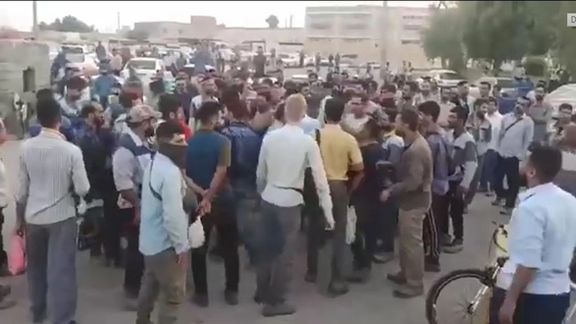
Iran’s oil refinery workers n Abadan began a strike on Tuesday as the government told the media that these labor actions are purely for wages and not political.

Iran’s oil refinery workers n Abadan began a strike on Tuesday as the government told the media that these labor actions are purely for wages and not political.
Amid nationwide antigovernment protests, a widespread strike by oil and petrochemical workers could be very damaging for the government’s finances.
Petrochemical contract workers went on a strike and protested on Monday in the southern city of Asalouyeh, on the Persian Gulf coast. A worker’s group announced on social media that managers shut down some plants to prevent workers gathering in the surrounding streets to protest.
A regional governor claimed on Tuesday that workers who went on strike in Assaluye petrochemical plant were angered by a dispute over wages and had not joined antigovernment protests.
But an announcement by an oil workers’ protest organizing committee on the Telegram messaging app on Tuesday said their strike and rallies are in solidarity with nationwide protests. They also demanded the release of workers apparently arrested on Monday. They vowed to continue their strike and protests, hoping that workers in nearby cities will join them.
Iran has been rocked by more than three weeks of protests after a 22-year-old woman was arrested for “improper hijab” and killed in police custody in mid-September. The movement quickly turned into demonstrations against the Islamic Republic, with protesters routinely chanting “Death to the dictator”, and rejection of the clerical regime that has ruled Iran for 43 years.

It was for the first time in 43 years that Iranians saw the hard-liner and tough judge, Gholam-Hossein Mohseni Ejei, speaking softly on Sunday.
The Iranian Chief Justice on Monday carefully chose his words and controlled his tone not to sound the same as always, threatening opponents. The head of the Iranian Judiciary sounded very different from a weak ago.
He said: “I’m ready. Let’s talk. If we’ve made mistakes, we can amend them,” however, hardly any Iranian believed him. The call may have been made far too late.
Thousands of protesters have been jailed by Iran’s Judiciary since 2017 and almost no one has received a fair trial. The cases of hundreds of people killed by security forces in the streets in November 2019 has remained sealed.
The change in Ejei's rhetoric was so noticeable that many in Iran and overseas took it as a sign of weakness, not only for a senior cleric, but for an autocratic regime that was never shaken before, even when it faced major protests.
Ejei called on Iranians, who have taken to the streets for the 4th consecutive week, fighting back as they were beaten and shot at by regime thugs, to come forward, talk about their grievances and seek ways to bring back tranquillity to the streets of Tehran and tens of other Iranian cities.
On the same day, pundits who are allowed to speak told reformist daily Etemad that officials need to act like father figures and understand their children. Meanwhile, reformist figure Jalal Jalalizadeh called on the government in an interviewwith conservative website Nameh News to “quickly start a dialogue with the people.”
Jalalizadeh warned the government that “if it fails to sympathise with the people, the society will become even more bipolar and that is in no one’s interest.” He suggested. That the regime needs to consider itself as the people’s representative, respect their vote and views and listen to their demands.
He added that the new generation of Iranians have different demands from the previous generation.
Meanwhile, reformist Etemad Online website quoted renowned sociologist Asef Bayat as saying that “in the current uprising the people wish to take back their normal life that has been taken away from them immediately after the 1979 Islamic revolution. He said that the morality police has humiliated millions of women in the streets since then.
Comparing Iran to the Arab world where the Arab Spring took place more than a decade ago, Bayat said that the gap between the government and the majority of the people is wider in Iran than anywhere else such as Tunisia or Egypt.
He described the uprising in Iran as an all-encompassing movement that has gathered together all Iranians regardless of their social class and ethnicity. “Like the people in Tunisia and Egypt the people of Iran also want the government to respect for their dignity.”
Bayat added that "the main difference between the movement in Iran and those in Arab states is that the women have taken the lead in Iran in the struggle against the authoritarian regime," which has killed at least 91 [protesters] in Zahedan in the Province of Sistan-Baluchestan, and scores of others including two dozen under 18 young women and 12 children in Tehran, Kurdistan, Gilan and other provinces during the past three weeks. The sociologist noted that Iranian women started their opposition to the government dictated lifestyle from the first day after the 1979 revolution.
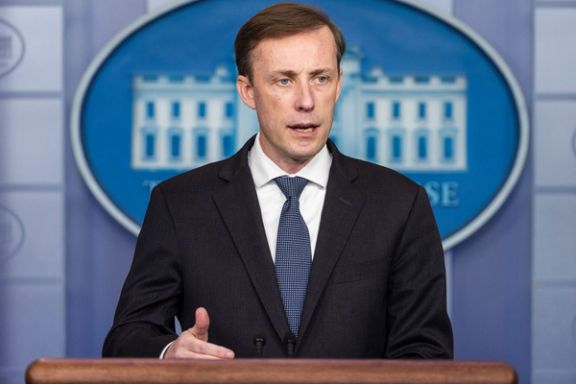
White House National Security Advisor Jake Sullivan said Monday that the entire world is watching the current situation in Iran, reiterating that the United States stands with the Iranians.
In a series of tweets, Sullivan said that “The world is watching what is happening in Iran,” pointing to several innocent protestors, including a young girl, who were shot dead over the weekend.
He decried the remarks by Iran’s President Ebrahim Raisi who compared protestors to “flies,” noting that “These protestors are Iranian citizens, led by women and girls, demanding dignity and basic rights.”
He vowed to stand behind the protesters, saying that Washington will hold responsible those using violence in a vain effort to silence their voices.
On Saturday, October 8, Sullivan spoke with Iranian women’s and human rights activists about how the US can continue to support protestors in Iran.
US Envoy for Iran Rob Malley told NPR last week that "What the US wants is a government in Iran that respects people's fundamental rights. It's not a policy of regime change. It's a policy of backing people who're protesting peacefully, because they want to be able not to wear a headscarf yet face an oppressive system."
Washington on October 6 imposed sanctions on seven Iranian officials over the shutdown of internet access and the crackdown on peaceful protesters. The EU are also putting significant pressure on Iran to stop Tehran from mistreatment of citizens
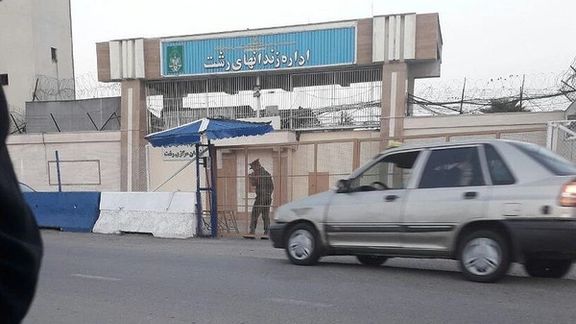
Several people were killed on Sunday during prisoners’ clashes with guards in Lakan Prison in the northern province of Gilan, a local prosecutor confirmed Monday.
The prosecutor general of the province Mehdi Fallah-Miri said on Monday that the clashes erupted among some inmates in the prison in the provincial capital city of Rasht.
He added that damage to the facilities of the prison and the power outage prevented infirmary workers from providing care to the injured, which led to the death of some of the prisoners. He did not disclose the number of casualties but confirmed that some of the injured are still under treatment in one of the hospitals of Rasht.
Fallah-Miri claimed that the situation is back to normal, but according to reports security forces are still stationed around the prison and streets leading to the prison are still blocked.
However, there are some reports that contradict the claims by the official, saying that the clashes had nothing to do with conflicts between the prisoners.
According to some sources, who spoke to Radio Farda on condition of anonymity, some of the prisoners revolted against the prison guards during a transfer of some prisoners, who took some officers hostage and took control of the corridors.
Prisoners from other wards joined the rioters, and the conflicts escalated. Prison guards, who could not control the situation, asked for outside reinforcement, the sources said.
Computers, cameras, and phone lines in the prison have been reportedly destroyed while there are reports of the fire, gunshots and teargas on social media.
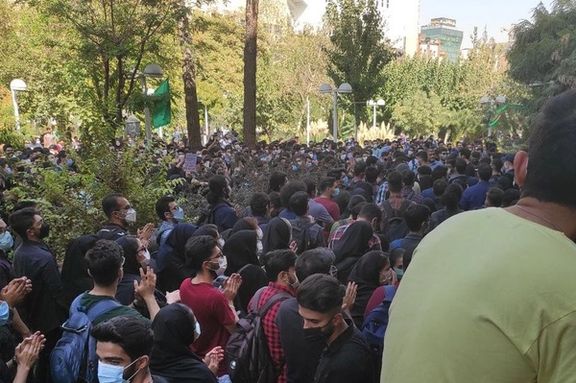
Protests reignited in several Iranian cities Monday evening, as oil workers went on strike in the south and activists called for nationwide rallies on Wednesday.
The day started with a few protest gathering in universities, as news emerged that hundreds of oil workers in Asalouyeh, on the Persian Gulf coast went on a strike and blocked roads near processing plants. Reports later on Monday indicated that a few plants were shut down by managers, but workers' groups vowed to continue protests in the surrounding area.
In the evening Tehran time social media accounts began reporting protests in the capital, several cities in western Iran and in the south. Below we provide news and videos about these demonstrations.
But what constitutes perhaps a more important developments was a statement by a group of activists known as ‘Tehran Youth’ for nationwide protests on Wednesday. This was the group that had called for the large protests on Saturday, October 8, that brought out crowds in various parts of Tehran and several other cities, showing the power of the “revolutionaries”, as many nowadays call themselves.
Tehran Youth issued a statement calling for Wednesday’s protest in response to security forces opening fire with military weapons against protesters in the Kurdish city of Sanandaj Sunday night, killing several people, although a reliable number does not exist. Some sources say four people were shot dead.
The Kurdish human rights group Hengaw reported Monday that security forces committed many "crimes against the people of Sanandaj," but due to a total internet blackout, no images are available yet. The group said that they have received many voice messages about these incidents.
Our live coverage ended at 01:00 Tehran time on Tuesday.
----------------------------------------------------------------------------------------------------------------------------
--------------------------------------------------------------------------------------------------------------------------
--------------------------------------------------------------------------------------------------------------------------
Amnesty International in this Persian tweet warns about the situation in Sanandaj, saying security forces have been using guns against protesters and firing tear gas into people's homes.
---------------------------------------------------------------------------------------------------------------------------
---------------------------------------------------------------------------------------------------------------------------
Protests took place Monday night in Nezam Abad district of Tehran. One tweet around 23:30 local time said that people used incendiary devices against security forces but the government has slowed down Internet connection and it is hard to send images.
Another tweet from Tehran said that gunfire was being heard from Nezam Abad, around the same time. Two explosion were also heard in the area, presumed to be some kind of homemade device thrown at Basij forces.
One video showed a government agent who fell into the hands of the protesters.
--------------------------------------------------------------------------------------------------------------------------
A group of protesters marching in the Ekbatan district of Tehran, chanting "Death to the dictator".
--------------------------------------------------------------------------------------------------------------------------
Protesters in Marvdasht in southern Fars Province are trying to set fire to a banner bearing the image of IRGC general Qasem Soleimani who was killed by a targeted American air strike in Iraq in January 2020.
-----------------------------------------------------------------------------------------------------------------------------
Protesters have lit fires and blocked roads in the western city of Kermanshah. The tweet says they have control of the streets.
-----------------------------------------------------------------------------------------------------------------------------
People chanting "Death to the dictator" from their windows and balconies in a district of Tehran.
-----------------------------------------------------------------------------------------------------------------------------
Protests in the western Kurdish city of Sanandaj on Monday after security forces fired military weapons at protesters the day before and killed several people. These protests continued Monday evening.
---------------------------------------------------------------------------------------------------------------------------
Another video showing security forces again firing at protesters in Sanandaj Monday evening.
Another video from Sanandaj in which gun shots are heard.
----------------------------------------------------------------------------------------------------------------------------
Protesters shout "Death to the dictator in Saqqez, a pre-dominantly Kurdish city and the hometown of Mahsa Amini, the young woman who died in the custody of hijab police and her death triggered the current protests.
----------------------------------------------------------------------------------------------------------------------------
Drivers honking in the northwestern city of Tabriz and blocking and blocking streets, a protest tactic.
----------------------------------------------------------------------------------------------------------------------------
Drivers and pedestrians protesting in the southern city of Shiraz Monday evening, chanting "Death to the dictator."
Protesters in Kazerun, southern n Iran appear to be running away from security forces Monday evening.
----------------------------------------------------------------------------------------------------------------------------
Protest in the western city of Hamedan Monday evening. Demonstrators are chanting, "Death to the dictator."
----------------------------------------------------------------------------------------------------------------------------
A large protest by students in Amir Kabir University in Tehran on Monday.
-----------------------------------------------------------------------------------------------------------------------------
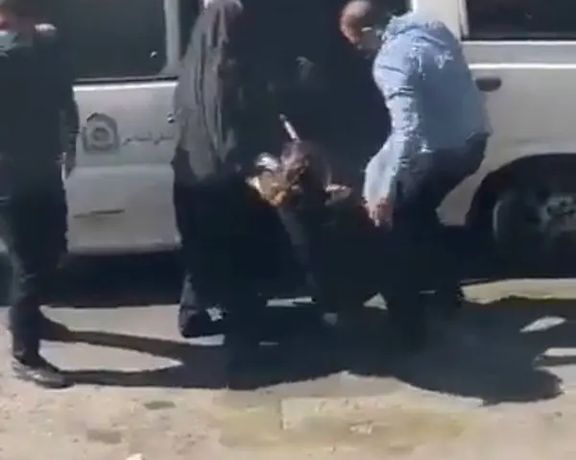
Britain has sanctioned Iran's so-called “morality” or hijab police, over its threats of detention and violence to control what Iranian women wear and how they behave in public.
"These sanctions send a clear message to the Iranian authorities – we will hold you to account for your repression of women and girls and for the shocking violence you have inflicted on your own people," Foreign Secretary James Cleverly said in a statement on Monday.
He noted that the sanctions are imposed on morality police in its entirety, as well as both its chief, Mohammed Rostami Cheshmeh-Gachi, and the head of the Tehran Division, Ahmad Mirzaei.
The new measures mean that the designated individuals cannot travel to Britain and any of their assets held in Britain will be frozen.
The death of 22-year-old Mahsa Amini in hijab police custody has sparked protests against the theocratic regime across Iran and internationally, with Iranian demonstrators calling for the downfall of Supreme Leader Ali Khamenei and the Islamic Republic.
Last week, the British foreign ministry said it had summoned the Iranian charge d’affaires, Tehran’s most senior diplomat in Britain, over the crackdown on the protests. As fierce antigovernment demonstrations have entered their fourth week and close to 200 protesters are reported to have been killed by security forces, European countries, the United States and Canada have issued statements and some sanctions against those Iranian officials who have been identified as responsible for using repressive measures.
Tweet unavailable